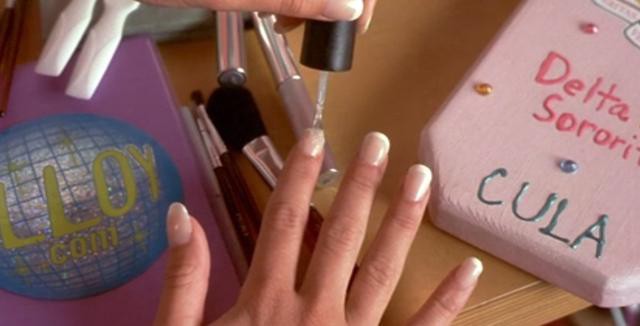Further Reading

When I went to beauty school there was an unspoken rule that we would all volunteer as models for each other. During classes we would partner up with another student and take turns applying smokey eyes or bullet wounds, depending on what day of the week it was, but we were also encouraged to drop by the waxing or hairstyling or manicure classes for their daily lessons. That’s where I got the world’s shakiest French manicure. Each line was a different size because there weren’t enough models to go around; I had several students sharing my hands, each painting one or two nails.
In Toronto I was lucky enough to frequent salons owned and operated by some of those former beauty school classmates, women I knew and respected and admired. Even for these women who are lucky enough to work for themselves and with friends, running a salon is fucking hard work, as is any sort of aesthetic labor: you slump down to get close enough to your client, you inhale chemicals, you’re often on your feet all day, and of course there’s the emotional labor any sort of customer service job entails. The women I know are very good at their jobs and they love their work, but that doesn’t mean it’s easy.
I never had to think about the labor practices of these salons because I knew everyone. I knew my manicurists and I knew about their kids and their weekends and their partners and their favorite movies and foods. I knew they were being paid minimum wage, if they weren’t the owners or managers themselves, and I knew their clientele tipped well. I knew they enjoyed their work and I enjoyed being their customer.
Since The New York Times published Sarah Maslin Nir’s incredibly thorough and illuminating article on the conditions of nail salons in New York I’ve been speaking to a lot of friends about what we should do going forward. The question we need to ask ourselves is, I think, a simple one: if we want to get manicures in New York, as I would like to do now that I live here, how do we make sure they’re ethical?
The answer is not, as I’ve seen some people suggest, to stop getting manicures as a rule. Like, if you don’t like manicures, then great! This is not a labor issue that directly impacts you! But that doesn’t mean only regular nail salon patrons have to change their practices. So much exploitation and abuse happens in female-dominated industries (particularly beauty and fashion, such as nail care and clothing manufacturers) precisely because these industries are frequently diminished and dismissed as being unimportant, non-essential, and elective. People believe they can get away with abusing their employees because they don’t think anyone is paying attention. And that is frequently a correct assumption.
I think the best thing we can do, regardless of whether or not we participate in aesthetic services like manicures, is to show that we’re watching and thinking and criticizing and, ultimately, to put our money and our solidarity where our mouths are. Or where our nails are. Whatever. You get it.
Here are a few articles I’ve read since the original piece came out. There are some really good resources for supporting workers, or for making better choices in the future, or for doing manicures yourselves.
- Cuomo Orders Emergency Measures to Protect Workers at Nail Salons
- Should Prices at Nail Salons and Elsewhere Reflect Their True Cost?
- How Can You Get an Ethical Manicure? Support Worker Organizing
- Here’s How to Give Yourself an At-Home, Guilt-Free Manicure & Pedicure
- How To Get An Ethical Manicure: A Guide To Spotting Worker Exploitation
- What Getting Your Nails Done Really Means
- New York Healthy Nails Salon Coalition
If I missed anything or you have any suggestions, just leave them in the comments.